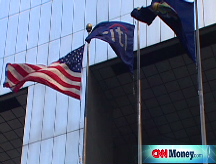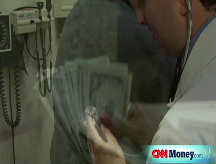Is Citi the next AIG?
The government now has a bigger say in Citigroup. But that may not be enough to save the bank...just look at what's happened to AIG.


 |
| Shares of AIG have continued to plunge since September -- despite an infusion of more than $150 billion from the government. |
NEW YORK (CNNMoney.com) -- You and I will soon own a very big chunk of Citigroup.
The bank announced Friday morning that the Treasury Department will convert preferred shares it owned following last year's bailout into common stock. The deal will give the government -- and taxpayers -- as much as a 36% stake in the bank.
This was spun as good news. Citi (C, Fortune 500) claims it boosts its financial health in the short term. And the government went out of its way to point out that no new taxpayer money is being put at risk.
That all may be true. But to see how this could all go awry we need only look to what's happened to AIG since the government essentially took it over last fall.
In September, the Federal Reserve agreed to take about an 80% stake in AIG (AIG, Fortune 500), with a loan then worth $85 billion.
The bailout has since ballooned to more than $160 billion. The government announced Monday morning it was extending another $30 billion in aid after the insurer reported a mind-blowing $61.7 billion fourth-quarter loss.
How did this happen?
When the government agreed to help AIG, it threw out top management (something it did not do with Citi Friday), and indicated that the loan would bide time so AIG could sell off pieces of itself in an orderly manner instead of at fire sale prices in liquidation. AIG would then use the proceeds to pay back the government.
But AIG has turned into the house that Tom Hanks and Shelley Long bought in "The Money Pit." No matter how many coats of paint new AIG CEO Edward Liddy slaps on the company, there's no denying that AIG is still a dilapidated mess.
AIG has faced a difficult time selling off some of the parts that have not been completely gutted by the bad credit default swaps that ultimately brought down the whole firm.
MetLife (MET, Fortune 500) and French insurance giant AXA (AXA) have reportedly made bids for AIG's life insurance business while AIG is said to be in talks to sell its auto insurer to Zurich Financial Services.
However, with most insurance companies struggling during this recession, it's unlikely that any company is going to make an aggressive bid for a part of AIG. For this reason, the government also announced Monday that it was putting two of AIG's life insurance businesses into trusts controlled by the government.
"The notion that you can break these assets up in this marketplace and easily sell them is a flawed one. It will take a great deal longer to do that. There are limited options for the government," said Haag Sherman, managing director with Salient Partners, an investment firm based in Houston.
What's more, any prospective buyer knows that AIG really has no power to negotiate for a higher price, especially since the government has already shown that it's willing to pump money into AIG more than once to keep it afloat.
"What's their leverage? AIG no longer has any. There are some good assets but they are all buried under toxic holdings," said Barry Ritholtz, CEO and director of equity research at research firm Fusion IQ.
"When the government took over AIG, they should have spun out the core insurance units into a separate company immediately to make it easier to sell it. Instead, you have this slow drain," he added.
And unfortunately for taxpayers, there appears to be some eerie comparisons between Citi and AIG, which means that even though the government did not commit any new money to Citi on Friday, it may have to do so again very soon.
"The bank has been effectively nationalized. There is now a bigger incentive for the government to pour more money into the black hole that is Citigroup," Ritholtz said.
Sherman agreed. He pointed out that since Citi is still going to be subject to the newly unveiled stress tests for big banks, it's hard to imagine how Citi can avoid needing more funding in the next few months. He does not believe private investors would step in and help out.
"This is taking the same path as AIG. Citigroup is going to need substantially more capital," he said.
That is obviously not good news. Consider that on the day the Fed announced its deal to save AIG, the stock closed at $3.75 a share. This morning, it was hovering at just 45 cents. If that's any indication, Citi, even at just $1.50 a share, still could have more downside. ![]()



